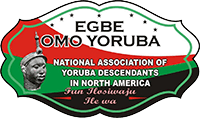The Egbe Omo Yoruba saw the need and resolved to establish and empower the Moremi Foundation, The autonomy certificate was launched and we were ready to establish and empower any other group that may have similar ideas and expertise to prepare blueprints for future development in Yorubaland within or outside the framework of present-day Nigeria. We resolved that this should be a very comprehensive document that covers fields as far apart as technological development and theatre development. A special group was organized to prepare a well-thought-out position paper on what type of RESTRUCTURED NIGERIA we are prepared to participate in. We prepared the Yoruba constitution and launched the Yoruba flag at the Houston convention. At the Houston convention we held the second election and initiated a peaceful transition from the incumbent executive to a new executive under the Leadership of Professor Segun Gbadegesin of Washington D.C. chapter 1997-1999 followed two years later by Dr McGuinis Olumuyiwa Otubusin of the Houston Chapter 1999-2001, followed by Mr late Alao seni of Atlanta chapter 2001-2003, followed by Lasisi Mohamed of Atlanta chapter, 2003-2005, followed by Ola Oduwole of Miami Chapter 2005-2007, followed by Agba Akin Odusanya of Miami chapter, 2007-2011 the only two term president, followed by Yeye Afin Tenabe of Baltimore chapter, 2011-2013.The first and only female president. Mr Boluwaji Omodele is the current President; he was elected at the 2013 Convention in Baltimore, Maryland.
Egbe Omo Yoruba decided and brainstormed on how to harness the efforts of various Pan-Yoruba organizations scattered all over the world for the attainment of any of the two goals identified in the Yoruba Charter. The egbe Omo Yoruba warned against what the Yoruba people know how to do best: forming huge organizations that have no feet on the ground. We did not attempt to reinvent the wheel. Already, there are several Pan-Yoruba associations in Europe and America. We decided to tap into their energies without imposing another layer of bureaucracy that may consume time and energy. We decided and resolved to form an Oodua Freedom Network (OFN). This Network was to be headquartered in Nigeria with another regional office in a neighbouring African country with substantial Yoruba presence, and two other regional offices in London and Washington, with the possibility of sub-regional offices in other parts of Europe and America.
We Joined forces with Odua People Congress (OPC) Dr. Fredrick Faseun attended the 2001 convention where former governor of Oshun State Chief Olabisi Akande was the key note speaker Egbe Omo Yoruba held a meeting in London and set up three Task Forces to work out the modalities of federating existing Yoruba organizations with commitment to the Yoruba Charter into a Network. There was one Task Force each for Europe, America, and Africa. Each Task Force were authorized to mobilize the Yoruba organizations in its region to join the Freedom Network. The three Task Forces regularly exchange notes. It was made clear to each Yoruba organization that buying into the Yoruba Charter is a non-negotiable condition for being admitted into the Network. It was resolved that regular meeting of NEC and meeting of representatives of all organizations interested in joining the Network must be held quarterly
While the Task Forces were carrying out their terms of reference, the organizations present at the London meeting was charged to find ways to exchange notes on their contributions so far to the rudimentary stage of the struggle, and take decisions on what projects they can collaborate on for the advancement of the objectives of the Yoruba Charter of September 14, 1994. There is a sense in which realists or pessimists would sigh and say that the problem facing the Yoruba in those evil days in Nigeria was insurmountable, especially given the extent of our impoverishment by our oppressors and the huge arsenal of weapons of death under their control. But, we decided and we determined to remember that HISTORY is on our side. No other group could have been at a worse disadvantage than the Black people of South Africa under apartheid. With determination and will-power, they got their freedom. The choices before us then are not many: TO CHOOSE NOT TO STRUGGLE AND REMAIN COLONIZED AND ENSLAVED BY THE ISLAMIC NORTH OR TO STRUGGLE AND REGAIN OUR PRIDE AND PLACE IN HISTORY.



